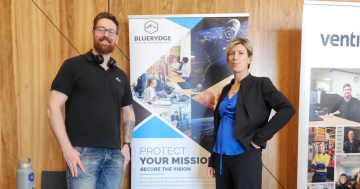Nick Deligiannis* explains why teamwork is important in the workplace and how people can develop their skills.
 Over the past 12 months, a lot of soft skill conversations have focused on the importance of adaptability.
Over the past 12 months, a lot of soft skill conversations have focused on the importance of adaptability.
Given how enormously adaptive the workforce had to become this past year, this shouldn’t come as a surprise.
However, today another soft skill has come to the fore.
Our newly released Hays Salary Guide FY21/22 shows that teamwork is the number one soft skill employers value in employees right now.
Notably, we also found that almost all employers (96 per cent) consider soft skills to be either more important than, or equally important as, a candidate’s hard or technical skills.
So, why is teamwork the top soft skill for employers today?
And how can you win the recognition of an employer by developing great teamwork skills in the workplace?
Why is teamwork so important?
As a study of 1,400 workers commissioned by Slack found, employees want to work collaboratively.
Ninety-one per cent of respondents said they want to feel closer to colleagues, while 85 per cent want to feel closer to their remote colleagues.
Teamwork is beneficial for several reasons:
Teamwork is more conducive to productivity
Firstly, when projects are steered by individuals, the individual shoulders the entirety of the workload.
But when employees collaborate with a team of skilled professionals on a project, all parties share the workload.
At the same time, a group of people working together possess a range of different skill sets.
This diversity of skills can improve outcomes.
There’s also more opportunities to match each individual team member’s skills and strengths with the tasks they’re best-equipped to complete in the course of the project.
Staff relationships often grow stronger
When employees work in silos, their communication, big-picture view and knowledge are restricted.
By enlisting various people to collaborate on projects and solve problems, your employees are more likely to instigate and participate in productive conversations for the purposes of shared goals.
Employees who collaborate effectively start to think as a team motivated by shared goals.
Stronger bonds and relationships between team members also create a solid workplace culture and improve staff morale.
Corporate knowledge is elevated across the organisation
All employees bring their own corporate knowledge, commercial acumen and experience to teams.
When employees exchange and share ideas, knowledge and information, that intellectual capital becomes more concentrated across the organisation.
This heightens the potential of the organisation to fulfil its strategic goals.
How to develop your teamwork skills
There are many essential skills you can develop to become a more effective team player in your organisation.
You can start by targeting skills development in areas such as communication, listening, problem solving and time management.
Communication:
- To work together effectively in a team, you need to open lines of communication.
To confirm your communication skills are up to scratch, pay attention to how effectively you communicate information to others, both verbally and non-verbally.
- For instance, look at some of your recent written communication and reflect on how concisely and clearly you have shared information.
Also consider how responsive you are to requests for information from stakeholders and colleagues.
- In order to work well together, everybody in a team, including you, should be proactive about communicating.
Listening:
- Are you an active listener? To avoid misunderstandings and ensure everyone in the team feels that their contribution is valued, it’s important to be an active listener.
- Even if you disagree with a particular team member, have an open mind and look at the issue from their perspective.
Given them your full attention and ask questions if you need further clarification.
- Together, this opens you to the views of everyone in your team.
Problem solving:
- At the heart of teamwork is problem-solving, big and small.
- The more adept you are at solving problems, the more positive an impact you can have participating in your team.
- To be an effective problem solver, ensure that you clearly identify the problem you are endeavouring to solve.
If necessary, take some time to align with your fellow team members to ensure you all see the problem the same way.
This will save unproductive conversations that fail to hit on the same issue.
- Don’t forget to brainstorm a range of solutions. Take the time to evaluate each idea objectively.
It might be that one single solution is the answer to a problem; however, it might be that an amalgam of solutions is the best way forward.
- Sometimes there might not be complete consensus, but the best solutions are often those that have majority support across the team.
If there’s division, negotiate and compromise.
- Remember to document the key points and items of actions in team settings, so everybody is on the same page on the next steps to take when it’s time to get to work.
Time management:
- Good time managers set aside time to plan how to be most productive. They are adept at ordering their tasks by priority and urgency.
They minimise the time they spend working outside designated work hours to complete their tasks.
They safeguard time that they need to focus on important tasks.
- Excelling in all these areas makes you a much more capable team player who sets manageable deadlines and delivers what your team need from you, when they need it.
How to demonstrate your teamwork skills to employers
Given the importance employers are placing on teamwork today, proving you have these skills will enhance your appeal as a job candidate.
However, to really make an impression on a potential employer, you’ll need to add more to your CV than mere statements that you are a good team player.
Instead, share successes that demonstrate your teamwork skills.
For instance, perhaps you were part of a team that won a lucrative client contract, implemented a new system or delivered a key project ahead of schedule.
Such concrete examples allow you to show recruiters and hiring managers that you have successfully used your teamwork skills.
When applying for jobs or attending interviews, think about quantities of targets you’ve hit within your team.
You can also talk about your key achievements within team projects or the number of projects you’ve worked on in team settings.
Be a team player
As the most sought-after soft skill in today’s workplace, taking the time to develop your teamwork skills and knowing how to prove them to a potential employer will aid your career development.
It may take time to improve these skills, but by mastering teamwork you’ll be seen as a more effective and valuable group team member.
*Nick Deligiannis is Managing Director of Hays Australia and New Zealand.
This article first appeared at hays.com.au.











